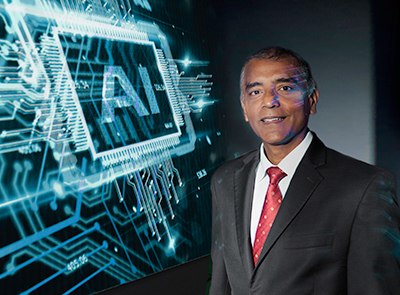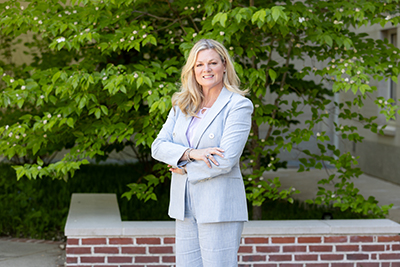
The potential of artificial intelligence seems limitless, and organizations everywhere want in.
Machine learning AI algorithms can sift through incredible amounts of financial data to make investment suggestions and generate analyst reports. AI-based robots zip around warehouses, stocking and pulling items, updating inventory systems as they go. Large language model customer-service chatbots sound like humans when they interact with consumers. AI imagery analysis can make fast, accurate medical diagnoses.
And these are just a few of the ways artificial intelligence is transforming industries and changing the future of work and life today.

“It’s a growing tidal wave,” says Mark Urbanczyk ’02, who leads the government AI & Data Engineering practice at Deloitte Consulting. For the last 20 years, he has witnessed the growing interest in data analytics and AI, helping both public and private clients with their journey to become more data-driven.
“Around the middle of the 2010s, a lot of progress and momentum started to emerge, and then the pandemic really sped up the digital transformation drive across government.”
In November 2022, OpenAI launched its free ChatGPT AI chatbot that anyone could use to generate content, followed by similar offerings from competitors, igniting the current AI boom.
According to Deloitte’s 2024 State of Generative AI in the Enterprise quarterly survey, 75% of organizations said they expect the technology to affect their talent strategies within two years.
“It’s incredible to see the interest across industries – particularly from the business and executive leaders who were not all in during the earlier analytics wave,” says Urbanczyk.
Organizations at all levels in all industries are trying to figure out how to integrate the technology – and manage its risks.
“The question is how do you use this technology to solve business problems,” says Prabhudev Konana, dean of the Robert H. Smith School of Business. “That’s where business schools play a big role.”
Going All In
Business schools need to train the next leaders to figure out which of society’s biggest challenges and greatest market needs can be addressed with AI
“Business school graduates should know how to make decisions using AI, what problems it can help solve, and what kinds of biases and unintended consequences could arise,” Konana says. “And they need to know how to come up with the strategy and governance for implementing it.”
That’s why the Smith School is going all in on AI, says Konana. The school launched a new AI center, introduced new AI curriculum offerings, and hired new faculty members who bring additional expertise to an already strong cadre of researchers studying AI. Faculty are translating their research findings in the classroom and using the latest AI technology in experiential learning projects with students.

One standout faculty member to join the school in fall 2023 is Balaji Padmanabhan, the Dean’s Professor of Decision, Operations and Information Technologies. He was one of the first professors to bring machine learning into an MBA program at the University of Pennsylvania’s Wharton School of Business. Now he’s pioneering AI at Smith.
“Business schools are tremendous enablers of AI,” Padmanabhan says. “Research is always a key part of what we do, as well as designing programs to educate students who are actually going to go out into the real world to make these things happen.”
Creating a Hub
In April, the Smith School launched the Center for Artificial Intelligence in Business to be the hub for AI research and outreach, working in conjunction with the University of Maryland’s new Artificial Intelligence Interdisciplinary Institute at Maryland. Padmanabhan leads the center, along with an advisory board of industry professionals and faculty members. The center’s mission is “to facilitate the creation of amazing and safe products and services through intentional design and governance.”
Read about some of Smith's latest research in AI.
This means helping businesses create short- and long-term value, he says, while being responsible stewards of AI who will be proactive in issues such as ethics, bias and human and societal impact. It will be Smith’s arm to the business and policy community through industry-focused events, including the annual AI Design and Governance Conference, the first of which was held in January 2024. Other community engagement events are in the works, says Padmanabhan, such as AI programs for small businesses and for local high-school students.
“In addition, the center wants to launch some unique and high-impact research projects that bring people in different departments and functional areas together at Smith and in collaboration with other schools and partners,” Padmanabhan says.
To do this the new center will tap into the school’s research and significant faculty expertise in artificial intelligence, analytics and data science, which spans multiple academic departments and centers of excellence. More than 40 faculty members across every discipline have research that looks at AI in some way – either using or studying it.
The center will also explore how humans fit in. Roland Rust, Distinguished University Professor and David Bruce Smith Chair in Marketing, wrote the book “The Feeling Economy: How AI is Creating an Era of Empathy.” He says workers with intuition, empathy, creativity and people skills will thrive. “As AI is taking over more thinking tasks, human workers are pushed more into feeling tasks. That is currently a differential advantage for humans, although we have active ongoing work on ‘feeling AI,’ that can effectively simulate human empathy.”
Professors Wendy Moe, Liye Ma, Kunpeng Zhang, and Wedad Elmaghraby work closely with companies such as Amazon, Deloitte and Meta on AI-related initiatives and translate those experiences into the classroom. And professor P.K. Kannan’s executive education initiatives in AI are making inroads with more companies.

The center also builds on Smith’s AI Initiative for Capital Market Research. Associate professor Sean Cao, director of the initiative, wrote a textbook on how to use AI in accounting and finance, and because it’s so important, he’s making it available for free. The initiative is funded by accounting firm GRF CPAs & Advisors, thanks to a push from Jacqueline Cardello ’93, firm president and managing director.
When Cao proposed the AI initiative, Cardello says her firm jumped at the opportunity to learn more about AI and support accounting students learning about it. “AI is the future and it’s still new to us, but it’s not going away.”
“Students, faculty, alumni and industry practitioners – we’re all working together to make good things happen for the whole community on AI,” says Cao.
AI in the Classroom
Part of Cao’s work includes designing a new master’s AI literacy course, which he’ll teach in the fall. He also plans to adapt the material for an undergraduate course in the future.
In spring 2024, Smith launched an AI specialization for full-time MBAs. It includes a series of courses that cover the foundations of AI, governance and systems design. Students learn to critically dissect AI’s capabilities, then use that understanding to explore business applications, ethics and responsible use of the technology.
Elena Maican, MBA ’24, enrolled in the specialization as a Flex MBA student to keep up with industry trends and rapidly evolving AI technology, which she’s already using as a knowledge management analyst at the World Bank. “I strongly believe we need to have a progressive mindset and embrace the change,” she says. “During these classes, I hope to gain insights on AI and transfer that knowledge to my colleagues in the workplace.”
Smith’s specialized master’s programs also incorporate training with AI systems for data analytics. Master’s program graduates leave Smith knowing how things like large language models work and how to build applications on top of them. For example, professor of the practice Clifford Rossi’s quantitative finance master’s students built the Mortgage Climate Risk Analyzer, an interactive dashboard that calculates mortgage vulnerability to physical risks caused by climate disasters. They developed it from an experiential learning project with government-sponsored mortgage enterprise Freddie Mac.
At the undergraduate level, Rust is leading a cluster of four courses in the University Honors Program that explore the importance of interpersonal skills in the AI revolution, how politics will manage deep fakes and algorithmic bias, and whether intelligence needs to be human to support life.
The goal is to weave AI learning throughout all programs so Smith graduates enter the workplace knowing how to use the technology to create value, says Konana. “That’s how our pedagogy has to evolve – to teach students creative problem-solving using AI.”
AI at Work
It’s that problem-solving mindset, as well as the knowledge of what AI is and how it can help an organization, that will make graduates tremendously attractive in the marketplace, says Padmanabhan.
“Every employer out there is talking about AI. Across the board, every CEO, every firm is interested.”
And the market is ripe for job candidates with AI skills. The Washington, D.C., region and many other regions outside of the tech epicenter of California are quickly rising in their share of job postings requiring skills in AI, according to the new UMD-LinkUp AI Maps jobs tracker. Developed by Smith professors Anil Gupta, Siva Viswanathan and Kunpeng Zhang alongside job data company LinkUp and consulting company Outrigger Group, the tracker uses AI technology to keep tabs on the spread of jobs requiring skills in AI across the country.
“This will define how to visualize and understand the landscape of AI job creation as it continues to evolve,” says Gupta, the Michael Dingman Chair and professor of Strategy, Globalization and Entrepreneurship. “We have been able to combine academic rigor, highly accurate employment data, and expertise in AI methodologies to help figure out how the demand for AI skills is evolving throughout the U.S.”
Smith’s Office of Career Services is also tracking companies looking to hire Smith grads with AI skills. The number of job descriptions that include AI terms has increased eightfold in the past decade. But employers want more than AI skills.
“As we’re hiring students, we are looking for a baseline AI fluency and understanding,” says Deloitte’s Urbanczyk. “They also need agility and a willingness to continuously learn, constantly be curious—that’s really important for students who want to be successful in the business world.”
Betting on the Future
Smith grads will have an enormous opportunity to shape the future of work with AI, starting now.
“One of the big opportunities is thinking of how work itself – every single person, every single task within a business – can be transformed using smart humans with an AI friend,” Padmanabhan says.
Urbanczyk agrees. “We like to say humans with machines are the future. Businesses that will succeed are going to put in the processes and have the talent to leverage AI to make their organizations more impactful.”
He says it’s a major disruptor, but AI won’t replace humans.
In fact, the AI revolution will likely create even more jobs for humans, says Konana. “More innovations will come that exploit AI and that will create more jobs. They may just be different jobs. I believe technology is going to evolve. We’re going to come up with new business models and exciting new products and services.”
Media Contact
Greg Muraski
Media Relations Manager
301-405-5283
301-892-0973 Mobile
gmuraski@umd.edu
About the University of Maryland's Robert H. Smith School of Business
The Robert H. Smith School of Business is an internationally recognized leader in management education and research. One of 12 colleges and schools at the University of Maryland, College Park, the Smith School offers undergraduate, full-time and flex MBA, executive MBA, online MBA, business master’s, PhD and executive education programs, as well as outreach services to the corporate community. The school offers its degree, custom and certification programs in learning locations in North America and Asia.